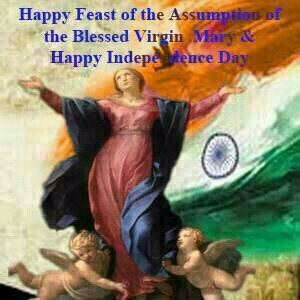
Dear Fathers, Sisters, brothers and Christ’s faithful,
On 15 August we celebrate a twin feasts, namely the Assumption of our Blessed mother and the Independence of our nation. The Feast of the Assumption celebrated on 15 August, is a day of profound joy for the Catholic Church. It commemorates the belief that Mary, the mother of Jesus, was taken up body and soul into heavenly glory at the end of her earthly life. The Assumption affirms the dignity of the human body, demonstrating that there is a place for our physical selves in the spiritual realm. It also presents Mary as a maternal figure in heaven, offering comfort and hope to believers. The Church sees the Assumption as a natural extension of Mary’s unique role in salvation history, beginning with her Immaculate Conception and continuing through her life as the Mother of God.
Mary’s Magnificat, her song of praise as recorded in St Luke, is seen as a portrait of her soul and personality. It highlights two key aspects of her character: her desire for God to be magnified in the world and her life and her deep connection to God’s word. These qualities make Mary a model of faith and humility for all believers.
The dogma of the Assumption, while not explicitly mentioned in Scripture, is supported by a long tradition of belief and practice in the Church. Early references to this belief date back to the second and third centuries, and a rich tradition of iconography depict Mary entering Heaven bodily. The Church sees scriptural support for the Assumption in passages that emphasize Mary's perfect union with Jesus' destiny as the Saviour.
The timing of the dogma’s formal definition in 1950 by Pope Pius XII, coming in the wake of World War II and at the onset of the Cold War, can be seen as a spiritual affirmation of hope and the ultimate triumph of good over evil. It offers a powerful counter-narrative to the materialistic and often hopeless worldviews that gained prominence in the 20th century.
15 August also marks India’s Independence Day, commemorating the nation’s liberation from British colonial rule in 1947. This event was the culmination of a long and often difficult struggle for freedom, led by figures such as Mahatma Gandhi and Jawaharlal Nehru. The path to independence was complex, involving strategies of non-violent resistance, civil disobedience, and negotiations with the British government. While independence brought joy and pride to millions, it was also accompanied by the painful partition of the subcontinent into India and Pakistan, leading to one of the largest mass migrations in human history and tragic communal violence.
In the decades since independence, India has emerged as a significant player on the world stage. The country has produced leaders who have made their mark in global politics and whose vision encompasses every sphere of citizens’ lives. The nation takes pride in its rich diversity - cultural, geographical, and natural - from the Himalayas to its rivers, flora and fauna, agricultural lands, and mineral resources.
However, modern India also faces numerous challenges. These include threats to its unity in diversity, concerns about media independence, economic pressures on the poor, ongoing border issues, disparities in education access, high unemployment rates, environmental degradation, and social issues such as human trafficking and corruption.
As we reflect on India’s journey since independence, we are called to be active participants in addressing these challenges. In the spirit of nation-builders like Dr Ambedkar, who gave India its Constitution, we must work towards building a society that upholds the ideals of freedom, justice, and equality for all. Both these events represent significant moments of transformation and hope. They remind us of the diverse ways in which human history unfolds, encompassing both spiritual and political dimensions. Both events speak to the human quest for dignity, freedom, and transcendence.
As we commemorate these two events, we are invited to reflect on our role in building a better world. Whether through spiritual devotion inspired by Mary’s example or through active citizenship in the tradition of India’s freedom fighters, we are called to contribute to the ongoing story of human progress and liberation. In the words of Rabindranath Tagore, we pray, “Into that heaven of freedom, my father, let my country awake.” This sentiment echoes both the spiritual elevation celebrated in the Assumption and the aspirations of a free India, uniting our earthly struggles with our highest ideals.
Most Rev. Dr. Albert Hemrom

